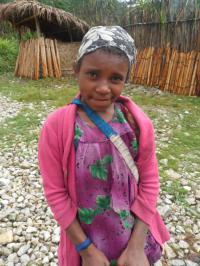PAPUA NEW GUINEA: Sexual violence forcing girls out of school
In the Pacific nation of Papua New Guinea (PNG) sexual violence against young girls, and the shame and stigma that follows, is forcing many out of school and others into early marriage.

The threat of sexual violence prevents girls in PNG from attending school
A recent study by Médecins Sans Frontières (MSF), one of the country’s main providers of medical and psychological assistance to survivors of family and sexual violence, showed that from 2008 to 2011, a significant proportion of patients who received treatment as a result of violence were children, some under the age of five.
In the rural settlement of Tari, 31 percent of those who reported violence were between five and 12 years old. In Lae, the second biggest city after the capital, Port Moresby, 26 percent were between the ages of 13 and 17.
Almost half of those reporting sexual violence In Lae from January 2008 to June 2010 - some 520 people - were under 18 years old. In Tari, 248 were minors, said Patrick Almeida, MSF’s medical coordinator.
“In both places, in over 70 percent of the cases, the perpetrators were known by the survivors,” he added.
“It’s really bad,” said Ume Wainetti, head of the NGO, Family Sexual Violence Action Centre (FSVAC), based in Port Moresby.
Young girls are already disadvantaged when it comes to education, and the threat of rape and sexual abuse aggravates these inequalities. As it is, parents generally hesitate to send their daughters to school because they will just get married and have babies. Boys will carry on the family name and continue to work,” Wainetti said.
The 2010 UN Educational, Scientific and Cultural Organization (UNESCO) Education Digest listed PNG as one of 16 countries worldwide with “severe” gender disparities. In PNG, boys are at least 10 percent more likely to start the first year of primary school than girls.
Gross enrolment rates in 2009 were close to 82 percent for boys, but only 74 percent for girls, according to the UN Children’s Fund (UNICEF).
The cost of tuition is one of the main reasons for the gap, according to UNICEF. In 2009 the government adopted a plan to gradually phase out school fees by 2015, when it expects to fully fund basic education.
A dangerous path
The remote locations of schools have even greater implication for girls, noted UNICEF. “Some kids have to walk for hours to get to school and the journey on the way to school makes them vulnerable to attack, especially for girls,” said Joseph Logha, Department of Education assistant secretary.
“The experience of sexual violence definitely affects a girl’s education in terms of being able to stay in school and school performance,” said Ruth Kauffman, MSF project coordinator at a Family Support Centre in Lae.
These donor-funded hospital-based centres are intended to be safe houses and “one-stop shops” for survivors of violence for medical, psychosocial and legal assistance.
“If a girl is raped, she may be blamed and beaten by family members. If she gets pregnant, she misses one year of school and may not be able to go back. Even if she doesn’t [fall pregnant], she’s already a different person. The trauma makes it difficult for her to concentrate on school work,” Kauffman said.
In some cases, the girl is married off to the perpetrator for a “bride price”- similar to a dowry. “Some communities see marrying her to the offender as a way to make him accountable for his behaviour, without considering the additional emotional trauma that the child will suffer,” said Elaine Bainard, UNICEF’s chief of child protection in PNG.
Wainetti said one way of ending a culture of violence is to change people seeing violence against women as a given. The NGO has recruited more than 1,000 male volunteers of varying ages nationwide to receive “gender sensitivity” training.
“Some witnessed violence and did not like seeing how their mothers were treated,” Wainetti said. “They want to have a role in ending that cycle, and this is a start.”
Source: IRIN
- 522 reads
Human Rights
Ringing FOWPAL’s Peace Bell for the World:Nobel Peace Prize Laureates’ Visions and Actions

Protecting the World’s Cultural Diversity for a Sustainable Future

The Peace Bell Resonates at the 27th Eurasian Economic Summit

Declaration of World Day of the Power of Hope Endorsed by People in 158 Nations

Puppet Show I International Friendship Day 2020

